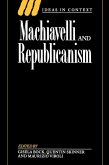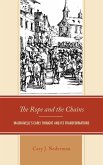- Gebundenes Buch
- Merkliste
- Auf die Merkliste
- Bewerten Bewerten
- Teilen
- Produkt teilen
- Produkterinnerung
- Produkterinnerung
Fully updated for the first time after thirty years, this new edition includes a thoroughly revised introduction by Quentin Skinner.
Andere Kunden interessierten sich auch für
![Machiavelli and Republicanism Machiavelli and Republicanism]() Gisela Bock / Quentin Skinner / Maurizio Viroli (eds.)Machiavelli and Republicanism40,99 €
Gisela Bock / Quentin Skinner / Maurizio Viroli (eds.)Machiavelli and Republicanism40,99 €![Machiavelli and the Orders of Violence Machiavelli and the Orders of Violence]() Yves WinterMachiavelli and the Orders of Violence34,99 €
Yves WinterMachiavelli and the Orders of Violence34,99 €![Machiavelli and the Modern State Machiavelli and the Modern State]() Alissa M. ArditoMachiavelli and the Modern State116,99 €
Alissa M. ArditoMachiavelli and the Modern State116,99 €![Machiavelli and the Modern State Machiavelli and the Modern State]() Alissa M. ArditoMachiavelli and the Modern State35,99 €
Alissa M. ArditoMachiavelli and the Modern State35,99 €![Machiavelli and Empire Machiavelli and Empire]() Mikael HornqvistMachiavelli and Empire122,99 €
Mikael HornqvistMachiavelli and Empire122,99 €![The Rope and the Chains The Rope and the Chains]() Cary Joseph NedermanThe Rope and the Chains111,99 €
Cary Joseph NedermanThe Rope and the Chains111,99 €![The Prince 2.0: Applying Machiavellian Strategy to Contemporary Political Life The Prince 2.0: Applying Machiavellian Strategy to Contemporary Political Life]() Jean-François CaronThe Prince 2.0: Applying Machiavellian Strategy to Contemporary Political Life41,99 €
Jean-François CaronThe Prince 2.0: Applying Machiavellian Strategy to Contemporary Political Life41,99 €-
-
-
Fully updated for the first time after thirty years, this new edition includes a thoroughly revised introduction by Quentin Skinner.
Hinweis: Dieser Artikel kann nur an eine deutsche Lieferadresse ausgeliefert werden.
Hinweis: Dieser Artikel kann nur an eine deutsche Lieferadresse ausgeliefert werden.
Produktdetails
- Produktdetails
- Verlag: Cambridge University Press
- Seitenzahl: 204
- Erscheinungstermin: 3. Januar 2019
- Englisch
- Abmessung: 222mm x 145mm x 15mm
- Gewicht: 396g
- ISBN-13: 9781107145863
- ISBN-10: 1107145864
- Artikelnr.: 53169477
- Herstellerkennzeichnung
- Libri GmbH
- Europaallee 1
- 36244 Bad Hersfeld
- gpsr@libri.de
- Verlag: Cambridge University Press
- Seitenzahl: 204
- Erscheinungstermin: 3. Januar 2019
- Englisch
- Abmessung: 222mm x 145mm x 15mm
- Gewicht: 396g
- ISBN-13: 9781107145863
- ISBN-10: 1107145864
- Artikelnr.: 53169477
- Herstellerkennzeichnung
- Libri GmbH
- Europaallee 1
- 36244 Bad Hersfeld
- gpsr@libri.de
Niccolo Machiavelli (3 May 1469 - 21 June 1527) was an Italian Renaissance diplomat, philosopher and writer, best known for The Prince. He has often been called the father of modern political philosophy and political science. For many years he served as a senior official in the Florentine Republic with responsibilities in diplomatic and military affairs. He wrote comedies, carnival songs, and poetry. His personal correspondence is of high importance to historians and scholars. He worked as secretary to the Second Chancery of the Republic of Florence from 1498 to 1512, when the Medici were out of power.
Editorial note
Introduction
Principal events in Machiavelli's life
Bibliographical note
Translator's note
Map: northern and central Italy, c.1500
Dedicatory letter: Niccolò Machiavelli to His Magnificence Lorenzo de' Medici
1. How many kinds of principality there are, and by what means they are acquired
2. Hereditary principalities
3. Mixed principalities
4. Why the Kingdom of Darius, which Alexander occupied, did not rebel against his successors after Alexander's death
5. By what means cities or provinces that lived under their own laws before they were occupied ought to be administered
6. New principalities acquired by one's own arms and ability
7. New principalities acquired through the arms and fortune of others
8. Those who become rulers through crime
9. The civil principality
10. In what ways the strengths of all principalities should be measured
11. Ecclesiastical principalities
12. How many kinds of soldiers there are, and mercenary troops
13. Auxiliaries, mixed troops and one's own troops
14. How a ruler should act concerning military matters
15. The things for which men, and especially rulers, are praised or blamed
16. Liberality and parsimony
17. Cruelty and mercifulness
and whether it is better to be loved than feared, or the contrary
18. In what way rulers should keep their promises
19. How contempt and hatred should be avoided
20. Whether building fortresses, and many other things that rulers frequently do, are useful or useless
21. What a ruler should do in order to be thought outstanding
22. On those whom rulers employ in secret matters
23. How flatterers should be shunned
24. Why the rulers of Italy have lost their states
25. How much control fortune has over human affairs, and by what means she can be resisted
26. An exhortation to seize possession of Italy and assert her liberty from the barbarians
Appendix A. Letters relevant to The Prince
Appendix B. Notes on the vocabulary of The Prince
Biographical notes
Index of subjects
Index of proper names.
Introduction
Principal events in Machiavelli's life
Bibliographical note
Translator's note
Map: northern and central Italy, c.1500
Dedicatory letter: Niccolò Machiavelli to His Magnificence Lorenzo de' Medici
1. How many kinds of principality there are, and by what means they are acquired
2. Hereditary principalities
3. Mixed principalities
4. Why the Kingdom of Darius, which Alexander occupied, did not rebel against his successors after Alexander's death
5. By what means cities or provinces that lived under their own laws before they were occupied ought to be administered
6. New principalities acquired by one's own arms and ability
7. New principalities acquired through the arms and fortune of others
8. Those who become rulers through crime
9. The civil principality
10. In what ways the strengths of all principalities should be measured
11. Ecclesiastical principalities
12. How many kinds of soldiers there are, and mercenary troops
13. Auxiliaries, mixed troops and one's own troops
14. How a ruler should act concerning military matters
15. The things for which men, and especially rulers, are praised or blamed
16. Liberality and parsimony
17. Cruelty and mercifulness
and whether it is better to be loved than feared, or the contrary
18. In what way rulers should keep their promises
19. How contempt and hatred should be avoided
20. Whether building fortresses, and many other things that rulers frequently do, are useful or useless
21. What a ruler should do in order to be thought outstanding
22. On those whom rulers employ in secret matters
23. How flatterers should be shunned
24. Why the rulers of Italy have lost their states
25. How much control fortune has over human affairs, and by what means she can be resisted
26. An exhortation to seize possession of Italy and assert her liberty from the barbarians
Appendix A. Letters relevant to The Prince
Appendix B. Notes on the vocabulary of The Prince
Biographical notes
Index of subjects
Index of proper names.
Editorial note
Introduction
Principal events in Machiavelli's life
Bibliographical note
Translator's note
Map: northern and central Italy, c.1500
Dedicatory letter: Niccolò Machiavelli to His Magnificence Lorenzo de' Medici
1. How many kinds of principality there are, and by what means they are acquired
2. Hereditary principalities
3. Mixed principalities
4. Why the Kingdom of Darius, which Alexander occupied, did not rebel against his successors after Alexander's death
5. By what means cities or provinces that lived under their own laws before they were occupied ought to be administered
6. New principalities acquired by one's own arms and ability
7. New principalities acquired through the arms and fortune of others
8. Those who become rulers through crime
9. The civil principality
10. In what ways the strengths of all principalities should be measured
11. Ecclesiastical principalities
12. How many kinds of soldiers there are, and mercenary troops
13. Auxiliaries, mixed troops and one's own troops
14. How a ruler should act concerning military matters
15. The things for which men, and especially rulers, are praised or blamed
16. Liberality and parsimony
17. Cruelty and mercifulness
and whether it is better to be loved than feared, or the contrary
18. In what way rulers should keep their promises
19. How contempt and hatred should be avoided
20. Whether building fortresses, and many other things that rulers frequently do, are useful or useless
21. What a ruler should do in order to be thought outstanding
22. On those whom rulers employ in secret matters
23. How flatterers should be shunned
24. Why the rulers of Italy have lost their states
25. How much control fortune has over human affairs, and by what means she can be resisted
26. An exhortation to seize possession of Italy and assert her liberty from the barbarians
Appendix A. Letters relevant to The Prince
Appendix B. Notes on the vocabulary of The Prince
Biographical notes
Index of subjects
Index of proper names.
Introduction
Principal events in Machiavelli's life
Bibliographical note
Translator's note
Map: northern and central Italy, c.1500
Dedicatory letter: Niccolò Machiavelli to His Magnificence Lorenzo de' Medici
1. How many kinds of principality there are, and by what means they are acquired
2. Hereditary principalities
3. Mixed principalities
4. Why the Kingdom of Darius, which Alexander occupied, did not rebel against his successors after Alexander's death
5. By what means cities or provinces that lived under their own laws before they were occupied ought to be administered
6. New principalities acquired by one's own arms and ability
7. New principalities acquired through the arms and fortune of others
8. Those who become rulers through crime
9. The civil principality
10. In what ways the strengths of all principalities should be measured
11. Ecclesiastical principalities
12. How many kinds of soldiers there are, and mercenary troops
13. Auxiliaries, mixed troops and one's own troops
14. How a ruler should act concerning military matters
15. The things for which men, and especially rulers, are praised or blamed
16. Liberality and parsimony
17. Cruelty and mercifulness
and whether it is better to be loved than feared, or the contrary
18. In what way rulers should keep their promises
19. How contempt and hatred should be avoided
20. Whether building fortresses, and many other things that rulers frequently do, are useful or useless
21. What a ruler should do in order to be thought outstanding
22. On those whom rulers employ in secret matters
23. How flatterers should be shunned
24. Why the rulers of Italy have lost their states
25. How much control fortune has over human affairs, and by what means she can be resisted
26. An exhortation to seize possession of Italy and assert her liberty from the barbarians
Appendix A. Letters relevant to The Prince
Appendix B. Notes on the vocabulary of The Prince
Biographical notes
Index of subjects
Index of proper names.








